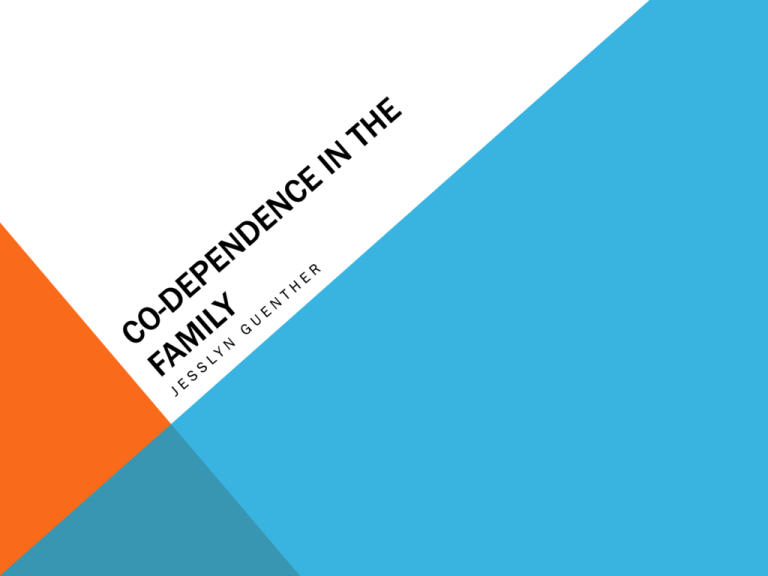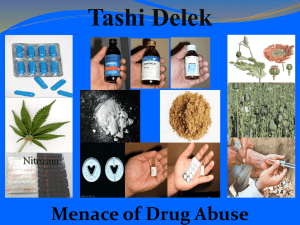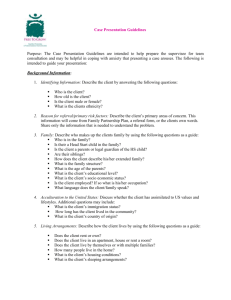Co-Dependence in the Family power point
advertisement

BOWEN FAMILY SYSTEMS THEORY - Theory of Human Behavior views family as an emotional unit and uses systems thinking to subscribe complex interactions in the unit. - Functioning of family members is interdependent: Change in one person’s functioning is predictably followed by a reciprocal change in the function of others. - Emotional interdependence will intensify under heightened tension (anxiety will escalate). BOWEN FAMILY SYSTEMS THEORY, CONT’D - Result: Individual becomes overwhelmed, isolated, and out of control. This is the person who accomodates the most to reduce tension in others. - Person literally “absorbs” anxiety and is prone to problems (i.e. drugs, alcohol, etc.) HOW SUBSTANCE ABUSE AFFECTS FAMILIES -Drug and alcohol abuse not only affects the abuser and his/her life, but also the lives of family members. -Addictions often create interpersonal problems for all family members, like; jealousy: you can grow jealous of your friends, your partner, other family members and other people in your life. Conflict with partner: you may have arguments, get/give the “silent treatment” or grow apart by putting your addictions first HOW SUBSTANCE ABUSE AFFECTS FAMILIES , CONT’D Conflict with children: you may argue with your children and they may disregard your authority or be afraid of you Conflict over money: you may struggle economically because of losing your job, taking time off from your job, making poor financial choices or simply pouring your money into your addiction. Emotional Trauma: you may create emotional hardships for your partner and or your children by yelling, talking down, insulting or manipulating. HOW SUBSTANCE ABUSE AFFECTS FAMILIES, CONT’D Violence: you may become violent or your family members may become violent with you, including slapping, hitting or smashing or throwing objects. Cheating: you may become distant from your partner and seek satisfaction through pornography, internet sex, prostitution or someone else in your life who you feel “understands” you. Separation: your behavior due to addiction may cause separation, divorce and/or isolation from other family members, particularly children, either because they’ve been taken from you or because they don’t want to be around. HOW SUBSTANCE ABUSE AFFECTS FAMILIES, CONT’D Patterns: your life example will influence your partner, your children and other family members. There is a high likelihood that your children will become addicted to drugs or alcohol. Health Risks: drinking while pregnant can cause fetal alcohol syndrome – damage to the baby’s brain. Smoking in the household can cause health problems for family members from secondhand smoke, including lung cancer. Being under the influence of drugs and alcohol will overall impair your judgment and can lead to neglect or harm. FAMILY ROLES IN CHEMICALLY-DEPENDENT FAMILIES -Rescuer/ Enabler: often steps in to save the addict, bails the addict out, makes excuses or fills in for the addict. Shielding the addict from consequences of substance abuse makes it easier for the addict to continue using. -Hero/Caretaker: Tries to divert attention away from the problem by being too good to be true, secretly hoping that exemplary behavior will somehow make it easier for the addict to stop using. High achievers who do everything to assure that the addict has as little responsibility as possible, minimizing the possibilities for trouble to occur. FAMILY ROLES IN CHEMICALLY-DEPENDENT FAMILIES, CONT’D -Adjuster/Lost Child: Behaves apathetically to distance self from pain; passively withdraw from upsetting situations; hurting but attempts to avoid feeling the pain by refusing to confront the addiction or its consequences. -Scapegoat/Rebel: Draws attention away from the family’s primary problem of dependency through delinquency or other misbehavior, reacts to feeling trapped by the situation at home by poor school performance, hostility and other behavior problems. -Mascots/Pleasers: Also draw attention away from the family by trying to please, by acting in a humorous way; the clown. STEPS TO RECOVERY FOR ALL FAMILY MEMBERS OF SUBSTANCE ABUSE - Ask for Help: If someone close to you abuses alcohol or drugs, the first step is to be open about the problem and ask for help for yourself, your family and your loved one. children who have alcohol or drug abuse in the family can get help by talking with adults like teachers, doctors or school counselors. - Get help for your loved one: Treatment is effective! Getting a loved one into care and finding support services for your family are the next steps toward recovery. . STEPS TO RECOVERY FOR ALL FAMILY MEMBERS OF SUBSTANCE ABUSE, CONT’D -Find out about treatment options: There are many treatments that work for addiction. Talk to your health care provider about these treatments. Stopping alcohol or drug abuse is the first step to recovery and most people need to stop. -Talk with children: It is important to talk with children about what is happening in the family and to help them talk about their fears and feelings. Children need to trust the adults in their lives and to believe that they will upport them. GROUP EXERCISE 1. I would like everyone to write down the names of all members of their family on a sheet of paper. 2. write down what you dislike about this member of the family. 3. write down what changes you would like to see with this particular member of the family. 4. write down what changes you would like to see in your family as a whole. 5. When you are finished, share your responses with the entire family and work on setting goals that you as a family can work towards in your substance abuse co-dependence recovery. REFERENCES Bowen Family Systems Theory Ppt Presentation-Author Stream, www.authorstream.com/.../The_Rock-51146-Bowen-Family-Systems-Theory Effects of Substance Abuse on Families – Chicago Tribune.com, www.chicagotribune.com/sns-health-addiction-families,o,2311189.story Substance Abuse and its Impact on Family Systems, www.uic.edu/jaddams/college/kincare/curriculum_videos/unit3.pdf Substance Abuse Affects Families, www.healthquality.va.gov/sud/SUDFamilyToolHiRes.pdf





